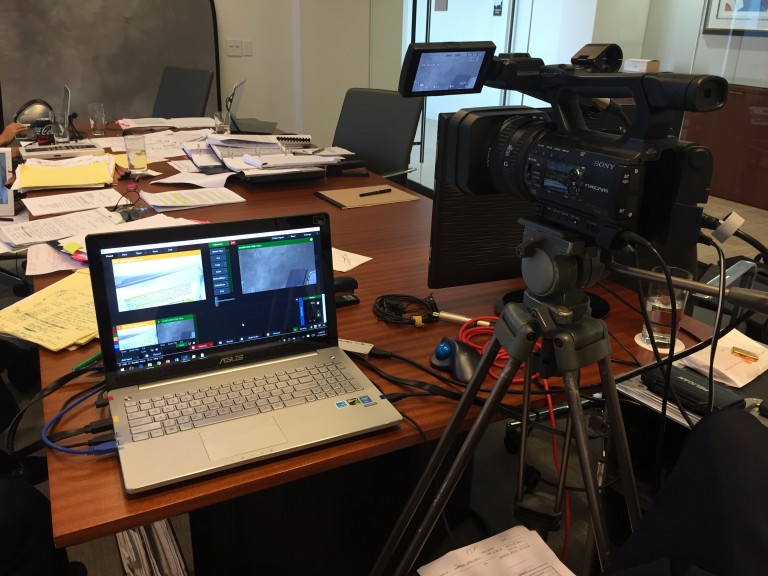Legal video depositions: A smart tool for preserving truthful testimony
The Relevance of Lawful Video Clip Depositions in Modern Legal Services: What You Should Know
Lawful video clip depositions have become crucial in today's lawful landscape. They offer a multidimensional view of witness testaments that standard transcripts simply can not match. By capturing both non-verbal and verbal communication, these depositions enhance the overall understanding of a witness's trustworthiness. The effectiveness of video clip depositions hinges on various aspects, including compliance with lawful criteria and finest methods. Exploring these components reveals their real significance in modern-day legal solutions
What Are Legal Video Clip Depositions?
Lawful video depositions function as an important device in the litigation process. They include recording witness statements in a video clip layout, recording both non-verbal and spoken interaction. This approach permits lawyers to document the attitude, expressions, and reactions of witnesses, offering a richer context for the statement. Typically conducted in a controlled atmosphere, these depositions are led by lawyers who ask inquiries while a stenotype reporter records the discussion. The resulting video clip can be crucial for test preparation, as it enables attorneys to examine the credibility of witnesses and refine their methods. Furthermore, lawful video clip depositions can be utilized in various legal contexts, ranging from civil disputes to criminal cases. The auditory and visual elements of video depositions boost the discussion of proof, making it an essential part in the modern lawful landscape. Generally, they add significantly to the efficiency and effectiveness of lawful procedures.

Benefits of Video Depositions Over Standard Techniques
Video depositions provide various advantages contrasted to typical approaches of taking witness statements. One significant benefit is the capability to capture both aesthetic and audio aspects, offering an extra thorough record of the witness's statements. This twin layout boosts clearness and allows attorneys to reference specific subtleties during trial preparation. Additionally, video clip depositions help with remote participation, making it easier for witnesses that may be inaccessible for in-person looks due to geographical restraints or health and wellness issues.Moreover, video depositions can accelerate the total deposition process, reducing the time and prices connected with travel and logistics. They additionally enhance accessibility, as taped depositions can be easily shared amongst legal groups and referenced any time. This ease contributes to far better situation monitoring and preparation. On the whole, video depositions represent a modern-day, reliable strategy to gathering witness testimonies, aligning with the evolving requirements of the lawful occupation.
The Duty of Body Movement and Tone in Testimonies

In legal video depositions, body movement and tone play vital functions in conveying a witness's trustworthiness and reliability. Nonverbal cues can offer understandings right into a witness's mood, influencing how their statement is viewed. Recognizing the influence of these elements is important for lawyers and jurors alike when reviewing the integrity of a testimony.
Nonverbal Communication Insights
While verbal communication is frequently highlighted in legal statements, nonverbal hints such as body movement and tone play a crucial duty in sharing credibility and emotion. Observers of depositions may keep in mind that a witness's stance, motions, and face expressions can substantially affect assumptions of reliability. For example, consistent eye get in touch with may signal confidence, while staying clear of stare could suggest dishonesty or discomfort. The tone of voice-- its pitch, pace, and quantity-- can present sensations of genuineness or unpredictability. Attorneys must be in harmony with these nonverbal signals, as they commonly give important context that matches talked words. Comprehending these subtleties can boost the efficiency of depositions and affect the result of lawful procedures.
Emotional Tone Effect
The emotional tone communicated during lawful testaments greatly impacts just how a witness is perceived. Body movement, vocal inflections, and faces play vital functions in shaping the story of a testimony. A witness displaying self-confidence with constant eye contact and a tranquil tone can infuse a sense of integrity and engagement. Conversely, indicators of anxiety, such as fidgeting or an unsteady voice, may lead to skepticism regarding their account. The subtleties of emotional expression can influence the analysis of facts, making it important for lawful professionals to recognize these signs. In video clip depositions, the auditory and visual parts integrate, highlighting the significance of psychological tone in sharing sincerity and reliability within the legal process.
Credibility and Credibility
A crucial consider establishing reliability and dependability throughout testimonies exists in the witness's body language and tone of voice. Viewers often rely upon non-verbal cues-- such as eye get in touch with, pose, and motions-- to evaluate a witness's genuineness. As an example, a witness that keeps eye call and presents open body movement might be regarded as even more straightforward and dependable than one who prevents eye get in touch with or appears closed off. Furthermore, tone of voice plays an important role; a steady, tranquil tone can strengthen the trustworthiness of the statement, while fluctuations in pitch or quantity might raise doubts. Inevitably, the mix of body language and singing tone considerably influences how a witness's declarations are gotten and interpreted in a lawful context.
Finest Practices for Conducting Video Clip Depositions
Conducting video clip depositions needs careful preparation and execution to assure a clear and efficient discussion of testimony. It is important to pick a silent, well-lit place to decrease diversions and secure ideal video clip high quality. The tools ought to be examined ahead of time, consisting of electronic cameras, microphones, and lights, to prevent technological issues during the deposition.Next, events included have to evaluate the style go to this web-site and treatments beforehand, seeing to it that everyone comprehends their functions. The deponent needs to be briefed on the procedure, consisting of how to respond plainly and concisely.Additionally, keeping a professional attitude throughout the session is essential. This includes avoiding talking over each other and verifying that all questions are guided suitably. Ultimately, it is crucial to tape the deposition in a layout that permits for easy playback and review, protecting the stability of the testament for future use.
Legal Considerations and Compliance Issues
How do legal factors to consider and compliance concerns affect hop over to here the efficiency of video clip depositions? Legal specialists have to browse an intricate landscape of laws, making sure that video clip depositions comply with administrative regulations and standards. Conformity with laws concerning privacy, consent, and recording methods is essential. Getting specific permission from all celebrations entailed is necessary to stay clear of lawful repercussions.Additionally, the admissibility of video evidence in court can hinge on conformity with step-by-step requirements. Guaranteeing that the equipment utilized meets technological requirements is likewise important, as poor top quality can weaken the deposition's reliability.Moreover, lawyers have to understand any type of specific state regulations that govern video clip depositions, as these can vary greatly. Failing to deal with these factors to consider can not only jeopardize the honesty of the deposition yet additionally influence the total situation strategy, eventually affecting the customer's legal end results.
Exactly How Video Depositions Impact Jury Assumption
While video depositions can serve as powerful tools in lawful proceedings, their influence on court understanding is considerable. The visual and acoustic components of video recordings offer internet jurors with an extra extensive understanding of witness demeanor, integrity, and psychological responses. This multimedia method can boost the jurors' ability to examine the integrity of testimony compared to standard text-based transcripts.Moreover, video clip depositions allow jurors to observe body language, intonation, and faces, all of which can impact their interpretation of the witness's declarations. The visibility of a witness on screen can humanize them, fostering empathy and connection, which may persuade jurors' point of views. Conversely, a witness who appears evasive or unreliable on video clip might lead to unfavorable assumptions that influence a jury's decision. Eventually, the vibrant nature of video depositions plays an important function in forming exactly how jurors analyze proof and reach their judgments.
The Future of Video Clip Depositions in Legal Method
As advancements in innovation continue to improve the lawful landscape, the future of video clip depositions is positioned for significant development. Advancements such as expert system, virtual reality, and boosted video clip conferencing devices are expected to improve the deposition process and improve accessibility. Attorneys may make use of AI-driven analytics to analyze witness reputation and instance stamina a lot more effectively.Moreover, the combination of virtual fact can permit juries to experience immersive simulations of depositions, supplying much deeper context and understanding. Furthermore, the pattern toward remote depositions is most likely to linger, offering higher versatility for attorneys and clients alike.As remote job comes to be significantly stabilized, video clip depositions will likely become conventional practice, reducing prices and time restrictions connected with typical techniques. In general, these technical improvements promise to boost the effectiveness, performance, and access of video depositions in lawful method, ultimately changing how lawyers get ready for trial.
Often Asked Questions
Just How Much Do Legal Video Clip Depositions Typically Expense?

Can Video Clip Depositions Be Utilized in Any Kind Of Sort Of Situation?
Video clip depositions can be used in various types of situations, consisting of civil, criminal, and family members law. Their versatility permits attorneys to present witness statements properly, adapting to the particular demands of various legal situations.
What Devices Is Required for a Video Clip Deposition?
To conduct a video deposition, essential equipment includes a high-quality video camera, microphone, illumination, and a trusted recording device. Additionally, a computer with modifying software program may be needed for post-production and formatting the last video clip.
For how long Does a Typical Video Deposition Last?
A common video deposition lasts between two to four hours, depending upon the complexity of the situation and the number of concerns presented. Extensive sessions might take place, yet breaks are generally included for individual convenience.

Are Video Clip Depositions Admissible in Court?
Video clip depositions are usually permissible in court, given they abide by lawful requirements and policies of evidence. Their use enhances clarity and maintains witness testimony, aiding in the judicial procedure throughout hearings and trials. Legal video clip depositions have actually ended up being important in today's legal landscape. In addition, lawful video depositions can be utilized in various lawful contexts, ranging from civil disputes to criminal cases. In addition, video clip depositions help with remote participation, making it less complicated for witnesses that may be unavailable for in-person looks due to geographical restrictions or health issues.Moreover, video clip depositions can speed up the general deposition procedure, reducing the time and costs associated with travel and logistics. Ensuring that the tools made use of fulfills technical criteria is additionally important, as inadequate top quality can undermine the deposition's reliability.Moreover, lawyers should be aware of any details state legislations that govern video clip depositions, as these can vary substantially. Furthermore, the fad toward remote depositions is most likely to persist, supplying higher adaptability for clients and lawyers alike.As remote job ends up being significantly normalized, video clip depositions will likely become common practice, minimizing costs and time restrictions linked with conventional approaches.